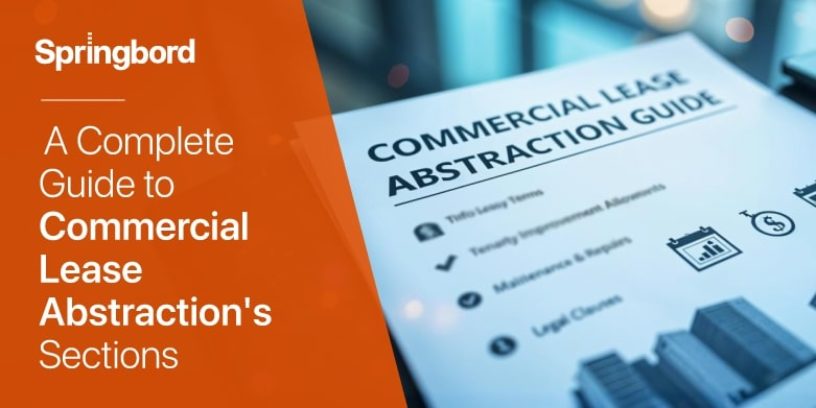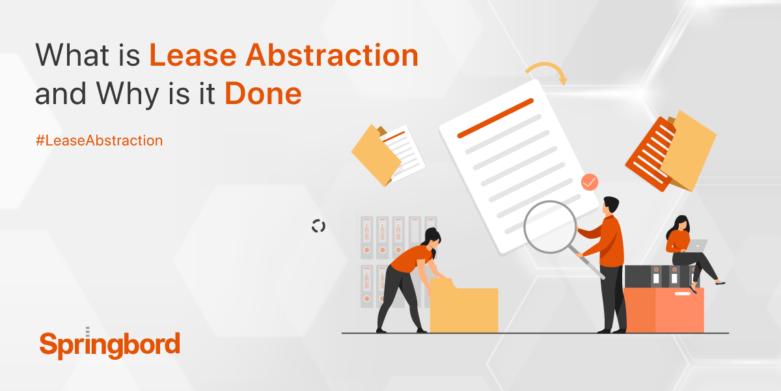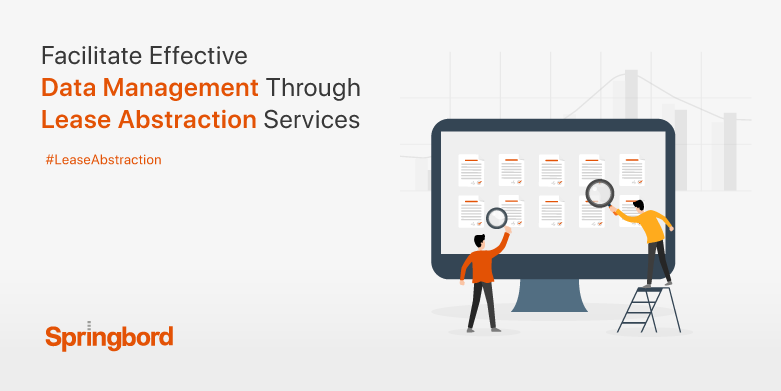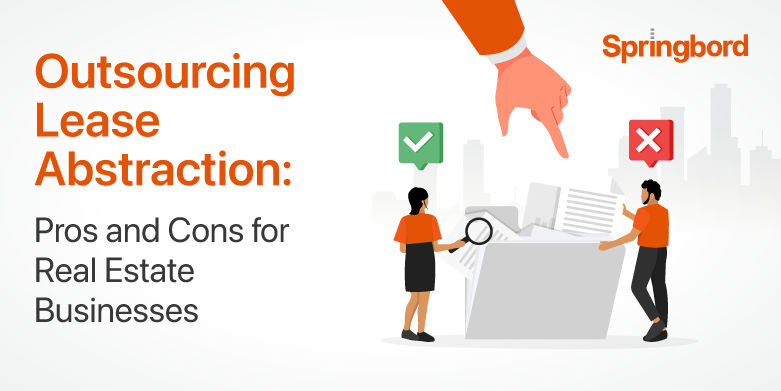 Read time 5 min
Read time 5 minManaging commercial leases can be a complex and time-consuming task, especially for business owners and property managers juggling multiple properties.
With terms ranging from rent calculations to environmental compliance, a thorough understanding of each section is important to avoid costly oversights and ensure long-term success. Commercial lease abstraction offers a solution by simplifying these complicated agreements into a clear, concise summary, highlighting the key clauses and obligations.
In this blog, we’ll break down each essential section of a lease abstraction, from rent structures and tenant improvement allowances to more advanced clauses like expansion rights and subordination agreements. You can streamline property management, mitigate risks, and make well-informed decisions by tailoring these abstractions to your business needs.
Key Lease Abstraction Sections
A commercial lease abstract’s sections are designed to highlight the most important aspects of the contract. These sections enable property managers and tenants to address issues proactively, ensuring operational continuity.
- Property Information: Important property details such as the address, square footage, unit number, and unique features like zoning laws or historical designations, may impact lease terms are mentioned here. These factors are crucial for understanding the property’s scope within the lease.
- Lease Parties: Identifies the landlord and tenant, including entity type (LLC, corporation, etc.) and jurisdiction. For corporate tenants, it also considers parent company guarantees affecting the lease.
- Lease Term: Specifies start and end dates, renewal options, notice periods, and rent escalations linked to market indices or triggers. Industry studies show that about 25% of commercial leases include rent escalation clauses, with notable long-term financial effects.
- Rent: Covers base rent, payment frequency, rent escalations, and security deposit. In multi-year leases, rent may increase annually by a fixed percentage or CPI index.
- Additional Rent: Includes CAM charges, property taxes, insurance, and utilities, often shared between tenant and landlord. Clear calculation and billing are key for accurate financial forecasting.
Springbord ensures all these details are captured accurately in our abstractions, providing clarity on potential future costs.
Contact Springbord to learn more about how we can assist you with essential lease abstraction sections that ensure clarity and compliance in your commercial lease agreements.
Advanced Considerations
Beyond the basics, advanced sections of the lease abstraction are important for dealing with complex financial and operational responsibilities. These elements can significantly affect both tenants and landlords.
- Tenant Improvement Allowance: Details tenant improvement allowances, usage restrictions, and handling of unused funds. Capital expenditures impact both parties, affecting property value and lease renewals. Springbord understands the complexities of tenant improvement negotiations and ensures that these details are clearly stated in our lease abstractions.
- Maintenance and Repairs: Clarifies which party handles maintenance and repairs, specifying structural versus non-structural duties. Landlords usually manage structural upkeep, while tenants handle interior maintenance, preventing potential disputes.
- Use of Premises: Specifies how the tenant can use the property, including zoning restrictions and prohibited activities. Zoning violations, particularly in urban areas, may lead to penalties or legal issues. Springbord’s expertise ensures that all zoning and usage terms are presented.
- Assignment and Subletting: Outlines tenant use, zoning restrictions, and prohibited activities, with zoning violations possibly resulting in penalties or legal issues.Springbord fully captures these conditions to protect both parties interests.
- Default and Remedies: Specifies lease defaults and available remedies, such as termination or damages. Includes notice and cure periods, crucial for preventing legal disputes.
Essential Financial Terms
The financial sections of the lease abstraction often carry the most immediate impact on a tenant’s bottom line and require meticulous documentation.
- Rent Abatement: Outlines conditions for rent waivers due to damage, construction, or disruptions. Understanding abatement clauses is crucial for business continuity during unexpected events.
- Operating Expense Reconciliation: Explains annual reconciliation of operating expenses and taxes, covering base year, tenant’s share, and adjustments. In multi-tenant buildings, costs are often divided by occupied square footage. Springbord ensures this complex calculation is clearly outlined in the lease abstract.
- Percentage Rent (for retail leases): Covers the portion of gross sales tenants pay as rent, common in retail leases tied to performance. Understanding percentage rent is crucial, especially in volatile markets.
Legal and Compliance Sections
Legal sections require special attention to ensure compliance with regulatory standards and protection from liabilities.
- Insurance and Indemnification: Lists the insurance both parties need and who covers liabilities, important for protection, especially in high-risk businesses.
- Environmental Compliance: Covers responsibilities for following environmental laws, crucial for industries handling hazardous materials to avoid fines or legal issues.
- Subordination, Non-Disturbance, and Attornment (SNDA): Explains that the tenant’s lease is secondary to the property’s mortgage but protects their rights if the property is foreclosed, ensuring tenant security during financing changes.
Operational and Logistical Clauses
Operational clauses define the day-to-day usage of the property, while logistical elements focus on access, modifications, and the obligations of the tenant and landlord during the lease term. These clauses are particularly important for maintaining a smooth operational flow.
- Parking: Outlines the number of parking spaces, fees, and usage rules. It covers reserved spots, customer parking, and any restrictions, crucial for retail or client-facing businesses. Springbord ensures that these elements are well-defined and easy to reference in a lease abstraction.
- Alterations and Improvements: Explains tenant rights to alter the space, landlord approval needed, and tenant’s duty to restore it at lease end, helping avoid conflicts and extra costs.
- Holdover Provisions: Explains terms for staying after the lease ends, with higher holdover rents to encourage vacating. Ensures all parties understand the financial and legal effects.
Springbord captures these terms clearly, ensuring that business owners are aware of any risks associated with overstaying their lease period.
Miscellaneous Provisions
These provisions often govern specific circumstances or additional rights that may not be addressed elsewhere in the lease. While they may seem minor, they can have significant impacts in certain situations.
- Estoppel Certificates: Confirms lease terms and status to third parties, like lenders or buyers, often required during sales or financing to verify the lease’s validity. Springbord ensures that this section is thoroughly detailed, providing clarity for all involved parties.
- Relocation Clauses: In some leases, landlords can relocate tenants, especially in large buildings. Since it might interfere with tenant operations, this section describes the relocation terms, including any compensation or rent adjustments. Springbord captures the nuances of relocation clauses to protect tenant rights and ensure smooth transitions.
- First Refusal/Offer: This clause lets tenants buy or lease nearby units if the landlord sells or leases them, offering opportunities to expand or secure strategic property.
Springbord understands the importance of these clauses and ensures they are clearly defined to offer tenants potential growth opportunities.
Conclusion
Outsourcing lease abstraction services is a practical and effective solution for businesses looking to navigate the complexities of commercial lease management. By partnering with experienced professionals, you can ensure that critical lease terms and obligations are accurately captured, minimizing the risk of costly mistakes.
This strategic decision not only streamlines the management process but also allows you to concentrate on your core operations without the burden of intricate lease details.
By choosing to outsource your lease abstraction service, you gain access to expert knowledge and efficient processes that can significantly enhance your overall operational efficiency. Springbord’s commitment to precision and clarity in lease abstraction enables both tenants and landlords to make informed decisions about their properties.







